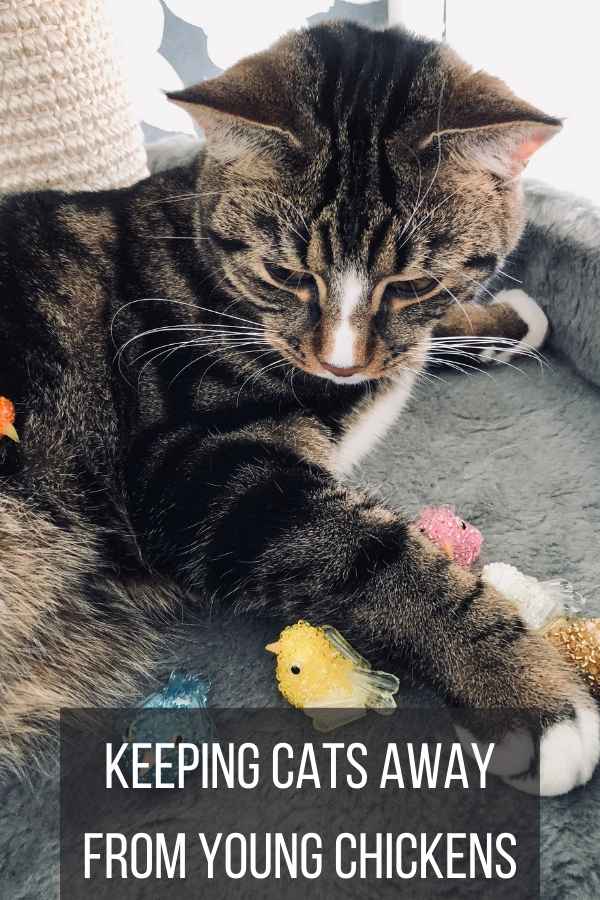Because cats are carnivorous predators, it’s natural to be concerned that a stray or neighbourhood cat will jump over your fence and attack your laying hens.
Are cats, on the other hand, really that dangerous?
Strut of a Stray Cat A neighbourhood cat would come by to stalk my birds when they were still young—feathered out but not laying eggs.
Cats can be a potential threat to chickens because they are carnivorous animals and feed upon meat. But, domesticated cats are not known to hunt on chickens because they are given proper food training by their owner.


Give Your Cat the Perfect Day
Get the Free Ebook!
Do Cats Kill Chickens?

Adult chickens are rarely killed by cats. Cats aren’t normally at the top of the list of things that killed my chicken. Cats are intelligent creatures.
Adult chickens are too large and have too many benefits, so they soon learn to leave them alone.
When you’re raising baby chickens, cats become a real problem. These irresistible morsels are bite-sized morsels.
You would say your cat is the cutest and most laid-back of all the cats. He might spend the whole day sunning in the window.
Cats, on the other hand, are also a hunted animal. They would want to play or chase if you put a bunch of baby chicks in front of him. The baby chicken does not fare well when acting on either instinct.
It’s better to keep your chickens in a safe area where cats can’t get to them until they’ve grown to a good size.
This makes your chickens safe and prevents your cats from doing something wrong.
Use a lid in the brooder. Make sure your eggs are enclosed when they’re outside.
Allow your chickens to roam freely only when their size is no longer an issue or a temptation. Your cats would be uninterested at that point.
Do Dogs Kill Chickens Too?
When it comes to chickens, dogs are the bigger problem. (Cattle guardian dogs, which are trained to protect your livestock, are not included in this discussion.)
Do chickens get killed by dogs? Yes, I agree.
Dogs that are feral and your dog is your pet. Your next-door neighbour’s pet dog is also taken to factor. Indeed, some argue that dogs are the greatest threat to backyard chickens.
This is a reasonable statement, since the threat may come from a variety of sources. Some people lose their pets due to their own dogs, their neighbours’ dogs, or free-roaming, wild dogs.
I’ve been lucky enough not to have any issues with my family’s dog. My flock, however, was assaulted by wandering dogs early on.
We lost ten hens in one fell swoop after the assault came out of nowhere. We came across the dogs as they were escaping. The dogs were not dispatched by us; instead, they were dispatched by a neighbour whose dogs were being assaulted by them.
This is where the problem with dogs arises. They may only take one or two birds at a time when dealing with a wild predator.
At the very least, it makes sense if you’re going to figure out how to keep chickens safe from hawks. Hawks, too, must eat.
Dogs aren’t killing for food; they’re killing for pleasure. They lose interest in the bird when it stops moving and move on to the next. They can do a lot of harm in a short amount of time.
If your chickens are slaughtered, what options do you have?
Can Cats Eat Chickens?
The chicken is a well-liked bird. Chicken is the most popular meat in the world, second only to pork. Chicken is a versatile protein that can be found in tacos, sandwiches, nuggets, and a variety of other dishes.
Poultry is an excellent source of the nutrients we need to stay strong and energetic throughout the day. Do you discover that your cat is begging for a taste of your chicken?
Cats are known to be carnivores. For a long time, images of wild cats eating birds have graced our screens, and it may seem natural to feed our cat any leftover table scraps.
Domesticated cats, on the other hand, often process “human foods” differently than we expect.
Many human foods are non-toxic and even useful to a cat’s diet, while others, even something as common as chicken, can cause digestive problems.
Chicken’s Health Advantages
It’s a compliment when someone says their food “tastes like chicken.” Chicken breast is a lean protein source that is also low in sodium and fat.
Many fitness enthusiasts consume chicken on a daily basis to aid in the development of lean muscle and to keep them satiated.
Vitamins and minerals aren’t just found in fruits and vegetables. Chicken is high in selenium, vitamin B6, and potassium, all of which are beneficial to your immune system.
Chicken is connected to healthy bones and teeth, in addition to retaining weight and building muscle.
Phosphorus in chicken not only aids in bone health, but it also ensures that your liver, kidneys, and central nervous system are in good working order.
Is It Possible For Cats To Eat Chicken?
Chicken can be eaten by cats, so it must be prepared properly.
“Cats are carnivores, so animal protein is critical to their good health,” Gary Richter, DVM, owner and medical director of Montclair Veterinary Hospital in Oakland, California, and Holistic Veterinary Care, tells Rover. Animal meats should make up the majority of cat food.”
Chicken is fine in small portions, but it shouldn’t be used as a food substitute, according to PetMD. It should also be as “naked” as possible, with no oils or seasonings added, as these could upset your cat’s stomach.
Experts recommend boiling plain chicken until it is thoroughly cooked, and not feeding extra fat trimmings to cats, as this can cause pancreatitis.
Above all, avoid feeding your cat chicken that has been boiled with onions or garlic, as these ingredients are poisonous to cats.
Is It OK For Cats To Eat Raw Chicken?
The idea of feeding your cat raw chicken has been discussed on the internet numerous times. Raw meat, on the other hand, is on the ASPCA’s list of dangerous foods for a reason.
Salmonella and E. coli, which can be poisonous to both your cat and you, can be found in raw chicken. It may also cause toxoplasmosis, a parasitic disease, and other infectious diseases.
Despite the fact that cats in the wild eat birds, due to all of these potentially harmful consequences, always carefully cook chicken before feeding it to your cat.
Chicken Bones: Can Cats Eat Them?
We may imagine cats gnawing on bones like their forefathers, but bones are also on the ASPCA’s list of poisonous foods.
This is due to the high risk of choking if bones are present. Small bones can get lodged in a cat’s throat or puncture their digestive tract, especially when dealing with birds or fish.
Treats, even protein-rich ones, can only account for 10-15% of a dog’s daily diet, according to veterinarians.
According to Dr. Richter, “the vast majority of what cats eat should be a balanced diet.” “Treats, in general, are unbalanced and should not account for a significant portion of a person’s daily intake.”
Problems With Cats And Chickens
It’s understandable to believe that cats will bother your chickens. Chickens are birds, and cats like chasing them.
Cats, on the other hand, are more likely to pursue animals that do not pose a danger. If cats are provoked, they will go after small birds, rodents, rodents, and sometimes other pets such as cats and dogs.
Cats will also be less likely to attack adult chickens as a result of this. If a normal cat fought a chicken or rooster, the cat would most likely win, but it would also most likely be injured.
It’s possible that a particularly aggressive rooster would cause a fight with your cat, but this is unlikely.
Normally, you’d only see a rabid or hungry cat attack a chicken, but this is an unusual occurrence.
You should pay more attention if you’re raising a brood of girls. Cats will not attack grown chickens, but they will happily harass tiny, defenceless creatures.
As a result, kittens are a prime target for cats. Here are a few things you can do to avoid an unfavourable encounter between your baby chickens and a cat.
Keeping Cats Away From Young Chickens

In general, it’s safer to raise your baby chickens in a secure environment. A barn, cellar, shed, or back porch should all fit the bill.
For a variety of reasons, having a closed space is essential.
To begin with, women aren’t very good at controlling their body temperature on their own.
You should plan on keeping them indoors until the temperature outside stays above 60 degrees at night.
The majority of owners want to set up a pen with at least one heat lamp for their newborn chicks.
This makes the baby chickens to warm up when they’re cold, as well as get away from the heat if it becomes too much for them.
Depending on how the baby chickens behave, you may choose to add or remove heat lamps.
Consider lowering the lamp or adding a second lamp if they are perpetually huddled under it. Consider raising or removing a lamp if they are very inactive and panting.
You can also keep your baby chickens safe from predators by raising them indoors. When you first get your baby chickens in the meal, they are about the size of an egg.
They make a lot of noise, smell bad, and can’t run fast enough. At this point, any carnivorous or omnivorous species could easily harm them.
This dilemma changes to some extent when you’re raising baby chicks in the winter.
While some wildlife is less active during the winter, non-hibernating animals such as feral cats, rats, and possums may become particularly hungry. This may cause them to enter human spaces when they otherwise would not.
Raising baby chickens in an enclosed space available only through a door would be a safe strategy.
Try to seal any bigger holes that a possum or raccoon might be able to get through, and set up rat traps for added protection.
How To Prevent Cats From Hunting Chickens?
While kittens are particularly dangerous to baby chickens, grown chickens face a different set of issues.
They’re usually kept outside, which makes them vulnerable to predators that wouldn’t bother your hens and roosters if they were kept inside.
Raccoons, possums, and coyotes should all be avoided at all costs. Coyotes may or may not be a problem in your area, depending on where you live. If your area has a history of coyote activity, it’s a good idea to plan ahead.

1. Electrocuted Boundary
An electric fence is a popular deterrent for predators. This will keep predators out and chickens out.
Electric fences aren’t normally powerful enough to kill a predator, so they’re safe to use if you don’t want to hurt any animals brutally.
Other possibilities exist if you need a more powerful deterrent.
If your hens and roosters are escaping too often, you may want to supplement with a higher fence.
A three- to four-foot-high fence will suffice for most breeds. Coyote attacks are usually avoided by erecting a fence like this.
Coyotes are more likely to attack at night, so keep your chickens in an enclosed coop after dusk to deter them from attacking them.
2. Live Traps
Another choice is to use live traps, but many chicken owners prefer to wait until they see a predator attacking their flock. There are usually only a few predators in a given area, and those that are present may naturally avoid your area.
If this is the case, placing the trap may simply attract an animal to your area that would not otherwise bother your chickens.
Live traps are often used in conjunction with some type of bait. Many different types of food can be effective, but fragrant foods like raw fish and wet cat food are the most effective. You can also use chicken feed as a substitute.
Many people expect a live trap to catch animals, so it’s possible that it’ll catch a feral cat or your own cat if you have one that lives outside. For some people, this makes live traps a less attractive choice.
Live traps can be useful in some cases, but you should still keep an eye on them and check them at least once a day if you use them.
If you catch a predator like a raccoon or a possum with your trap, you should have a plan in place to release the animal back into the wild.
Frequently Asked Questions
How do I protect my chickens from my cat?
Get a 6 foot fence and bury at least 6 inches of it into the ground to protect your chickens and chicks from other predators as well as cats. Other predators who may attempt to dig under the fence will be deterred by this.
Is it okay for cats to eat chicken?
Cats are carnivores, to put it bluntly. For a strong heart, clear vision, and a healthy reproductive system, they must consume meat protein. Cooked beef, chicken, turkey, and small portions of lean deli meats are excellent sources of protein. Your cat may become ill if it eats raw or spoiled meat.
Can a cat kill a rooster?
The rooster will most likely be killed by a wild Tom or barn cat. Domestic cats are not very robust, but they are well-equipped to kill roosters. Cats have a unique hunting technique in which they attack the neck area of their prey.
Final Words
Are you worried about how your cat would react to chickens? No need to be concerned; cats rarely attack fully grown chickens. The birds are far too large to be attacked by a cat, and they may even be able to defend themselves.
Chicks and younger chickens, on the other hand, may be a tempting food for a cat. Adult hens of one of the smaller bantam breeds may be stalked by a dedicated feline hunter.
The only way to keep your chickens safe from predators like cats is to keep them in a secure enclosure. Cover the fence with mesh or other safe and secure cable.
Your cat will soon wander off and look for a different snack after twitching her tail in disgust.
Let us know in the comments section below if your cat also hunts down chickens out of nowhere!
